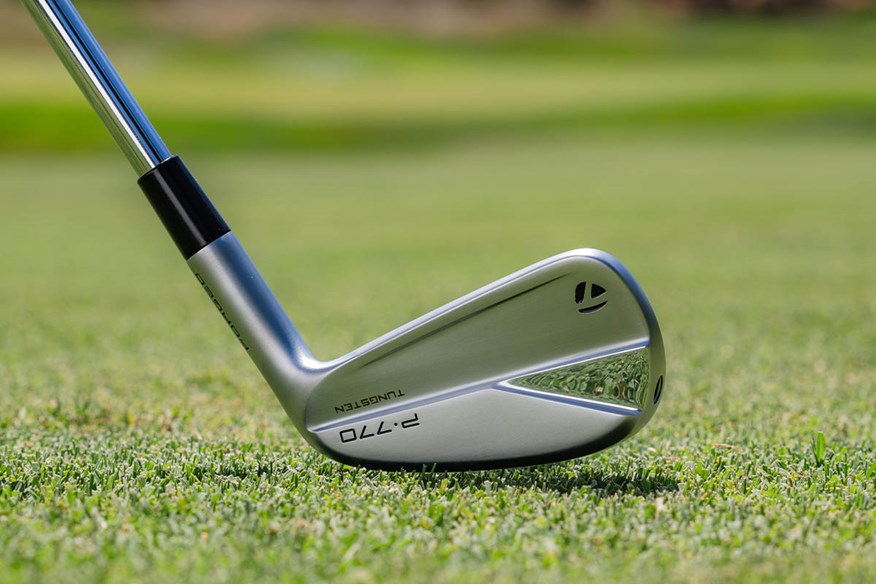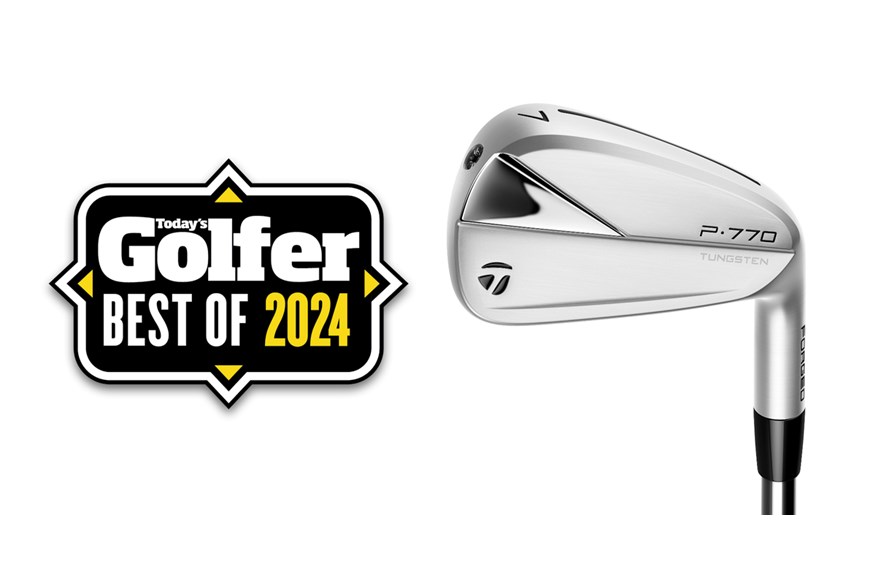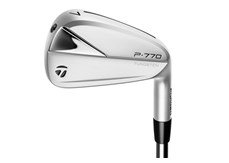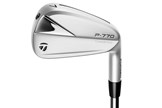Fastest and longest Players’ Iron available? TaylorMade P770 Iron (2023) Review
Last updated:
-
At a glance
- TG Rating
- Owner Rating
What we say...
With more of a “players” look than the P790, but more forgiveness than the P7MB and P7MC, TaylorMade’s P770 iron fills an important gap for good golfers.
The TaylorMade P Series are well-established as some of the best golf irons around.
The original TaylorMade P770 hollow body iron launched in 2020 and sold out within five days, and thanks to pandemic-related component delays it never came fully back into stock globally. So TaylorMade know there’s a huge appetite for this compact chassis players’ iron and this time the company swear they’re better prepared to keep up with demand.

Like the previous model, the new TaylorMade P770 has a forged 4140 steel face and soft 8620 carbon steel body. Inside, there’s SpeedFoam Air to support the face and dampen vibration, while a Thru-Slot Speed Pocket ensures maximum flex for shots hit low on the face.
There’s also up to 46g of tungsten positioned to create a flighted centre of gravity (CG), so the long irons have a CG that’s 1.1mm lower, making them a little easier to launch, while the shorter clubs offer increased control and spin.

TaylorMade say Tiger Woods is a massive fan of his P770 3-iron and, thanks to his input, the 3-6 irons have a fraction less offset than before.
See the P770 model as rinsing performance from a players’ iron chassis and you’ll be absolutely on the money.
Video: How does the TaylorMade P770 compare to other leading 2024 Players’ Irons?
Verdict: TaylorMade P770 iron
With 25 different models within the category, it could be said the players’ iron market is burgeoning with talent. That’s more models than we’ve ever tested, and it’s models like the P770 that are challenging the category boundaries. It wasn’t that long ago some thought players’ irons couldn’t have thin fast faces or hollow body constructions. Anything other than traditional lofts was frowned upon, and if the profile wasn’t sleek, slender, and classy, models were instantly laughed out of the room. Things have changed significantly today.
In previous years the P770 has been tough to categorize, but thanks to its players’ profile (and weak 33° 7-iron loft), which TaylorMade crams with ball speed and forgiveness-enhancing tech, this is clearly a modern-day players’ iron. And if you’re happy to accept tech within the players’ iron arena the P770 is just about as good as they come.

For those who question what hollow body constructions and thin fast faces bring to the party, comparing the P770 to TaylorMade’s P7MC gives a great explanation of what tech does for the category. Thanks to tungsten weighting inside and a hollow body construction the P770 has a slightly higher MOI. Which is good for golfers who hit lots of straight shots, but less attractive for golfers who like shaping shots onto a flag.
In our 2024 test, the P770 produced a ball speed 2.8 mph faster than the 1° weaker loft P7MC. Thanks to the hollow body and thin face shots launched with a fraction less spin, yet peaked out higher, and hit the green at a steeper angle (0.4deg), while adding 6 yards of additional 7-iron carry distance. In my book, those are all seriously impressive stats that will help decent club golfers score a fraction lower, more often. Whichever way you want to look at it the P770 is a modern-day beauty, and even if they are due to be replaced later in the year I still regard them as one of the best players’ irons of 2024.
Data comparison: How does the TaylorMade P770 compare to leading competitor Players’ Irons in 2024?
| Iron | 7-Iron Loft | Ball Speed | Launch Angle | Backspin | Height | Descent Angle | Carry Distance | Carry Distance Drop Off | Shot Area |
| PXG 0317 T | 32° | 125 MPH (1) | 15.6° | 5343 RPM | 32 YDS | 45.1° | 182 YDS (1) | 6 YDS | 118.2 SQ YDS |
| PXG 0317 CB | 33° | 122.8 MPH | 16.6° | 5568 RPM | 32 YDS | 45.7° | 179 YDS (T2) | 7 YDS | 142.1 SQ YDS |
| Vega VDC | 31° | 124.4 MPH (2) | 14.8° | 5703 RPM | 30 YDS | 44.4° | 179 YDS (T2) | 8 YDS | 236.8 SQ YDS |
| Srixon ZX7 MK II | 32° | 122.9 MPH (3) | 16.7° | 5757 RPM | 32 YDS | 46.1° | 178 YDS | 7 YDS | 57.4 SQ YDS |
| Sub 70 659 CB | 32° | 122.8 MPH | 15.3° | 5683 RPM | 30 YDS | 44.2° | 178 YDS | 8 YDS | 70.4 SQ YDS |
| More MOD 1 | 32° | 121.5 MPH | 15.9° | 5370 RPM | 30 YDS | 44.1° | 178 YDS | 2 YDS (1) | 48.4 SQ YDS (2) |
| Ping Blueprint S | 33° | 121.3 MPH | 16.7° | 5498 RPM | 31 YDS | 45.1° | 177 YDS | 9 YDS | 188.1 SQ YDS |
| Titleist T150 | 32° | 122.6 MPH | 17.5° | 5686 RPM | 34 YDS | 46.8° | 177 YDS | 4 YDS (2) | 53.6 SQ YDS (3) |
| Takomo 201 | 32° | 122.6 MPH | 15.7° | 6070 RPM | 31 YDS | 45° | 176 YDS | 9 YDS | 119.7 SQ YDS |
| Cobra King Tour | 32° | 120.9 MPH | 15.4° | 5534 RPM | 29 YDS | 43.1° | 176 YDS | 9 YDS | 253.8 SQ YDS |
| TaylorMade P770 | 33° | 122.3 MPH | 17.8° | 6143 RPM | 34 YDS | 47.5° | 175 YDS | 9 YDS | 200.7 SQ YDS |
| Mizuno JPX923 Tour | 34° | 121 MPH | 16.2° | 5704 RPM | 30 YDS | 44.6° | 175 YDS | 9 YDS | 171 SQ YDS |
| Vega VSC | 31° | 121.7 MPH | 15.2° | 5943 RPM | 29 YDS | 43.8° | 175 YDS | 14 YDS | 387.8 SQ YDS |
| Callaway Apex 24 Pro | 33° | 122.4 MPH | 16.2° | 6026 RPM | 27 YDS | 43.3° | 174 YDS | 7 YDS | 128.1 SQ YDS |
| Callaway Apex TCB | 34° | 121.9 MPH | 16.6° | 5189 RPM | 32 YDS | 46.1° | 174 YDS | 5 YDS (3) | 46 SQ YDS (1) |
| Mizuno Pro 243 | 32° | 122.2 MPH | 16.6° | 6035 RPM | 32 YDS | 46.3° | 174 YDS | 18 YDS | 387 SQ YDS |
| Ping i230 | 33° | 121.3 MPH | 16.4° | 5821 RPM | 31 YDS | 45.7° | 173 YDS | 19 YDS | 248.9 SQ YDS |
| Sub 70 639 CB | 32° | 122.3 MPH | 15.4° | 6584 RPM | 30 YDS | 45.4° | 173 YDS | 13 YDS | 266.5 SQ YDS |
| Callaway Apex 24 CB | 34° | 120.6 MPH | 16.7° | 6235 RPM | 31 YDS | 46.2° | 170 YDS | 9 YDS | 151.2 SQ YDS |
| Takomo 301 CB | 34° | 120 MPH | 17.3° | 6410 RPM | 32 YDS | 46.4° | 170 YDS | 7 YDS | 152.6 SQ YDS |
| TaylorMade P7MC | 34° | 119.5 MPH | 18° | 6226 RPM | 33 YDS | 47.2° | 169 YDS | 11 YDS | 135.3 SQ YDS |
| Wilson Staff Model CB | 34° | 118.6 MPH | 16.3° | 6221 RPM | 29 YDS | 44.8° | 169 YDS | 6 YDS | 76.8 SQ YDS |
| Titleist T100 | 34° | 118.1 MPH | 17.3° | 5677 RPM | 31 YDS | 45.4° | 169 YDS | 8 YDS | 107.2 SQ YDS |
| Ben Hogan PTX Tour | 33.5° | 117.9 MPH | 16° | 5767 RPM | 28 YDS | 43.5° | 169 YDS | 11 YDS | 335.5 SQ YDS |
| Titleist 620 CB | 34° | 117.9 MPH | 17.9° | 6127 RPM | 32 YDS | 46.5° | 167 YDS | 13 YDS | 274.3 SQ YDS |
| Average | 121.4 MPH | 16.4° | 5853 RPM | 30.9 YDS | 45.3° | 174.2 YDS | 9.1 YDS | 174.3 SQ YDS |
Check out the full TaylorMade P-Series range to see how the P770 compares to the P7MB and P7MC.
RELATED: Which TaylorMade iron is best for me?
About the author

Simon Daddow – Today’s Golfer Equipment Editor
Having tested and played more than 10,000 clubs in his life, what Simon doesn’t know about golf clubs isn’t worth knowing.
He spent a large part of his career as a golf club maker and product development manager, and has worked in the golf industry for more than 30 years. He joined EMAP Active (now Bauer Media) as Equipment Editor in 2006 and has worked for both Today’s Golfer and Golf World.
You can contact Simon via email and follow him on X (formerly Twitter) for loads more golf equipment insight.
Product Information
TaylorMade P770 (2023)
RRP: £1,149 | VIEW UK OFFER | VIEW US OFFER
Stock shaft: KBS Tour | 7-iron loft: 33° | Forgiveness rating: 2 – 2.5/5
Category: Players’ / Players’ distance



